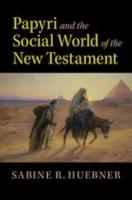
CUP (2019) p/b 206pp £18.99 (ISBN 9781108455701)
What have the following in common: Tatybynchis declaring on her registration document that she has a scar on her right thumb; an account book showing that Pausiris was paid an extra 24 drachmas per month for overseeing five shepherds, and Aphrodite complaining to her sister that, as a result of a horse treading on her foot, she had incurred large medical expenses? The answer is that these are three very ordinary people living in Roman administered Egypt, whose doings are known to us because scraps of papyri preserved, often in rubbish tips, in the dry sands of Egypt have survived and been translated.
These and thousands upon thousands of similar scraps which we now possess (and there are doubtless many more to be found) are not only fascinating in themselves, but, argues the author of this book, Professor of Ancient History at the University of Basel, an invaluable source for enhancing our knowledge, not only of Egyptian society, but of the world of the New Testament, a world in which the socio-economic status of the majority of its non-elite protagonists has been far too long neglected.
To support this argument H. needs to persuade her readers that the social background is transferable and that what was the case in Roman Egypt is also true for what we call the Holy Land and the regions which the apostles evangelised. She argues this persuasively in respect of the documents which relate to administrative matters, pointing to the general uniformity of administration throughout the Empire. Indeed, she suggests that the papyri may help to resolve the issue about Luke’s dating Jesus’ birth to a time when Herod was King of Judaea, Augustus had ordered a universal census and Quirinius was governor of Syria: three situations which other sources suggest did not coincide. The registration forms (such as that of Tatybynchis) which have survived, H. argues, imply a much looser census process, with local administrators invoking the Emperor’s authority without specific directions from Rome and conducting censuses for other than exclusively taxation purposes, and might, contrary to regular practice, require people to be registered not where they resided, but where they held property (and Joseph may have had property in Bethlehem). H. offers this as a possible, not necessarily definitive, defence of Luke’s historical accuracy.
H. structures her book by setting out what can be garnered from the papyri about the growth of the Christian church in Egypt and then using the papyri to highlight a number of socio-economic factors which are not necessarily apparent in more literary historical sources. There are chapters on the role of women, the family and the household composition of craftsmen, especially carpenters, travel by the less affluent, and those on the margins of society with particular reference to shepherds. These topics are covered with meticulous scholarship and frequent detailed reference to the papyri which mean that the reader is not simply overwhelmed with statistics, but that daily life is brought alive. H. ends by suggesting that there are many other topics or trades that would be illuminated by similar study. She mentions fishermen and a moment’s thought prompts many others (a rich source for PhDs)!
A word of caution must be raised, as not all aspects of life in the wider region may necessarily be as culturally transferable as local administration, but H. never tries to force comparisons beyond the evidence or reasonable deductions and some similarities with Roman Egypt are quite striking: for example, the papyri reveal a number of shepherds accepting individual responsibility for 100 sheep, cf. Jesus’ parable of the lost sheep.
No one who regularly studies the New Testament can fail to benefit from immersion in the material which H. has made available in this book, with its beautiful colour illustrations, its expansive notes, comprehensive bibliography and helpful indices. It shows massive learning, boundless enthusiasm and balanced judgment and is to be warmly commended.
Ray Morris
